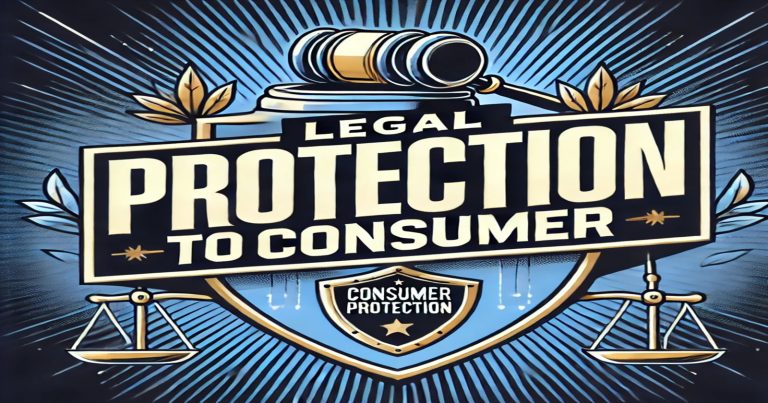Legal protection for consumers ensures buyers are protected against fraudulent, unfair, and deceptive practices in the marketplace.Consumers’ rights should be protected against unsafe products, misleading advertisements and immoral business practices. Governments and regulatory agencies implement laws to protect consumer rights and provide legal measures to exploitation. Consumer protection is required as it enables buyers, ensures proper trade, and makes businesses responsible. There are laws everywhere to ensure that consumers get proper rights, including compensation in case of fraud or damage.This article will discuss consumer protection, why it is important, the role of laws, and the measures taken globally and in India to ensure that consumers are not exploited.
What is Consumer Protection?
Consumer Protection is a set of laws, regulations and policies designed to protect the buyer from unfair trade practices, fraud and unsafe products. Businesses and service providers should work within moral and legal limits to ensure consumer safety and satisfaction. If a company is engaged in misleading practices, a consumer can seek legal measures under various consumer protection laws..
Governments, consumer forums, and regulatory bodies are working hand in hand to formulate and implement consumer protection laws. These are ensuring consumers receive safe products, honest information, and fair treatment in dealings. Legal protection for consumers in India and many other countries helps prevent businessmen from exploiting some persons who have less knowledge of their rights.
Key Objectives of Consumer Protection
- To prevent fraudulent trade practices
- Ensuring the safety of the consumer and product quality
- Transparency in pricing and marketing
- Legal redress for consumer grievances
Consumer protection is the need of the hour in a market-driven economy where businesses may go for profit at the cost of consumer welfare. Strong legal protectionforo consumer rights ensures that companies operate ethically and consumers make informed choices.
What is the Neeforof Consumer Protection?
Consumer protection is vital to ensure the fair and efficient functioning of the market. Without proper protection, businesses may exploit consumers via overcharging, false advertisements, manufacturing flaws, and deceiving contracts. Consumers require protection because individuals are generally not knowledgeable, affluent, or equipped legally to battle the exploitative practices of businesses.
Consumer Problems and Issues include
- False advertising: Many businesses employ deceptive advertising that leads to false promises, where consumers buy a product they would not normally buy.
- Distributing dangerous products: There are no adequate checks on business firms, so some may sell products that harm consumers or cause danger to health and safety.
- Overcharging: Some businesses engage in overpricing, adding fees that can cause consumers economic hardship.
- Lack of awareness: Most people do not know their rights or how to safeguard consumer rights, putting them at the mercy of fraudsters.
Consumer rights laws ensure that consumers get value for their money and that those cheated are compensated. Around the world, governments implement strict measures on consumer protection to ensure a fair marketplace where businesses and consumers can trade in mutual trust.
Who is a Consumer?
A consumer refers to anyone who purchases products or services for direct consumption and not for resale or any form of business. Even though this term varies with region and country, its basic meaning always brings out the fact that a consumer is any person who takes products for individual consumption. It is through consumer protection that any individual is regarded as a consumer if:
- They purchase or acquire a product or service for their consumption.
- They pay for or receive the product or service as part of a legal agreement.
- The quality, safety, or pricing of the product/service impacts them.
Consumers comprise retail shoppers, online shoppers, service customers, and those who use free services to collect their information. Protection of consumer rights under the law ensures that every consumer is dealt with equitably and without discrimination in the spending capacity.
Types of Consumer Rights
Every consumer has the right to be shielded from being exploited. It ensures that faeatment, good quality products, and correct information are givpurchase. These laws are here to enforce this. The main consumer rights are:
1. Right to Security
Everyone should be protected from dangerous goods and services. For example, to guarantee that people eat safe foods, medications, and electronics, among others, governments have safety standards for them.
2. Right to Information
Consumers have the right to know more about products, including price, ingredients, usage, and associated risks. Businesses should not advertise falsely and mislead consumers.
3. Right to Choice
Consumers should have many choices available to them and not be held hostage by monopolies or other practices dictating consumer purchases.
4. Right to be Heard
Consumers can criticise or even complain about products with flaws or unfair business practices. Governments have established consumer courts over which such complaints are determined.
5. Right to Redress
If any faulty product or service is offered to the consumer, the consumer is well within their rights to claim a return or compensation for the same. This keeps business in check as well.
6. Right to Consumer Education
Consumers should be well-informed of their rights and liabilities for deciding not to fall prey to scams or frauds.
Consumer rights are integral to the legal protection of consumer frameworks worldwide.
Consumer Protection Laws Around the World
Around the world, different countries have different laws in place to ensure that businesses work ethically to protect consumer rights. Some of the most notable consumer protection laws around the globe include:
United States
Federal Trade Commission Act (FTC Act): Bars unfair business practices and promotes the rights of the consumer.
Consumer Product Safety Act (CPSA): Standardizes product safety.
European Union
Consumer Rights Directive: Prevents hidden contract terms, overcharging, and refund policies.
General Data Protection Regulation (GDPR): Protects consumer data and privacy rights.
India
Consumer Protection Act, 2019: Protects consumer rights, prevents unfair trade practices, and provides legal remedies.
Governments worldwide ensure that consumers have legal avenues to protect themselves from exploitation.
Legal Protection to Consumers in India
The strong consumer protection laws of India protect citizens from any form of unfair trade practices. There are numerous acts and bodies in India enforcing legal protection towards consumers. Hence, businesses follow ethics and supply quality products and services. Measures prevent fraud, misleading advertisements, defective goods, and financial exploitation.
1. Consumer Protection Act, 1986 & Consumer Protection Act, 2019
Consumer Protection Act 1986 was the first comprehensive law that recognized and preserved consumer rights in India.It aimed at making consumers aware of their rights and provided a three-tier redressal mechanism, including District, State, and National Consumer Dispute Redressal Commissions, where consumers could file complaints against unfair trade practices and defective goods or services.
The Consumer Protection Act 2019 replaced the 1986 Act with more modern provisions, including e-commerce regulations, product liability, misleading advertisements, and stricter penalties for unfair business practices. The updated law also introduced Consumer Mediation Cells to facilitate dispute resolution without lengthy legal procedures.
2. Indian Contract Act, 1872
The Indian Contract Act of 1872 regulates all contracts entered into by buyers and sellers. It ensures that every contract for the sale of goods or services is made according to a legally binding agreement in which both parties fulfil their promises. It safeguards consumers as well as businesses through fair and legally enforceable contracts.
In case of a breach of contract, for example, where a seller has failed to deliver or supply a stipulated product, and a consumer refuses to pay for the goods supplied, then the aggrieved party can recourse to appropriate legal remedies such as compensation or rescission of the contract. This is an important law against fraudulent deals and unfair agreements.
3. Sale of Goods Act, 1930
The Sale of Goods Act of 1930 gives protection under the law in case of purchase of goods. He ensures the seller’s promise of quality products delivered across the country and keeps consumers on the safer side in case substandard, damaged or defective goods reach consumers’ ends. The Act declares:
- Goods should correspond to the description: A seller must say that a good has a specific feature only if it really has that feature.
- Goods should be of satisfactory quality: Goods must not be unsafe and free from defects.
- Customers have the right to replacement or refund: A buyer has a legal right to ask for a refund or replacement if the goods are faulty or misdescribed.
This legislation acts as a check on the trade and ensures that the consumers are not at a loss because of misleading advertisements or low-quality goods.
4. Prevention of Food Adulteration Act, 1954
Food adulteration is another serious problem in India, and the Prevention of Food Adulteration Act came into existence in 1954 to avoid food contamination and provide a healthy life for consumers.T he Act prohibits the mixing of harmful substances in food items and ensures that packaged food meets safety standards.
Under this law:
- Food manufacturers have to maintain hygiene and safety standards.
- Tough penalties are imposed on business houses found guilty of adulteration.
- Regular food inspections are carried out to check the quality of food products in the market.
The FSSAI enforces these rules by ensuring that the food products sold are pure, free from contaminants, and non-toxic. That act prevents health dangers from toxic chemicals, synthetic preservatives, and unhygienic food processing.
5. Trade Marks Act, 1999
The Trade Marks At, 1999 protects consumers from misleading branding and fake products. Most fraudulent businesses use fake trademarks or logos to cheat consumers into thinking they are purchasing a genuine product when, in fact, they are buying a low-quality or counterfeit item.
This Act ensures that:
- Every brand’s trademark is legally protected from being copied or misused.
- Consumers can trust branded products as genuine and of promised quality.
- Under this law, businesses selling fake or misleading products may also be litigated.
For example, if the logo is taken without any source mentioned by a fake sportswear company from a popular brand to dupe consumers, then the former brand is allowed to take legal action. This protection helps consumers make wise decisions so that they do not become victims of fake goods.
6. Bureau of Indian Standards (BIS)
The Bureau of Indian Standards ensures that the product is up to a certain standard of quality and safety before being sold in the market. BIS has laid down standards for industries like electronics, construction materials, textiles, and appliances, among others.
Products bearing the ISI logo are certified by BIS. This means that a product adheres to the national safety standards. For instance, electrical appliances, cement, and drinking water standards can pose serious threats if the products fail to meet the standards. The company would be liable to legal action with regard to fines and product recall if it does not comply with the BIS standards.
Government’s Role in Consumer Protection in India
Governments play a very important role in protecting consumers by creating laws and stringent regulations. They are not only responsible for formulating laws but also for regulatory bodies, product quality monitoring, and grievance redressal mechanisms. The role of the government is to ensure fair trade prevent monopolies, and consumer exploitation.
How the Government Protects Consumers
1. Construction and Impementation of Consumer Protection Laws
The government prepares laws like Consumer Protection Act 2019, which determines legal standards for businesses. Such laws define consumer rights, punish improper trade practices, and establish a formal system of prevention.Regular amendments ensure that laws stay relevant with changing market conditions, such as online shopping and digital fraud.
2. Setting Product Standards and Certifications
Regulatory bodies such as BIS and FSSAI also ensure that products meet quality and safety standards. The government compels testing and certification of commodities like electronics, packaged foods, and pharmaceuticals. This is a way to stop businesses from selling substandard or harmful products.
3. Handling Consumer Complaints and Grievances
Setting up consumer courts, helplines, and web portals for fraudulent practices and shoddy or defective goods or services. At the National Consumer Helpline website and the consumer commissions’ websites, there is easy recourse for lodging grievances. These ways ensure that any damaged or such product is recompensed/replaced by a company.
4. Educating Consumers About Rights
Governments run awareness campaigns through advertisements, workshops, and educational programs to inform people about consumer rights. Many consumers do not know how to protect consumer rights, so awareness initiatives help them make informed decisions and avoid scams.
5. Regulating e-commerce and digital transactions
The government has implemented new rules in e-commerce platforms to avoid any fake product listing, misleading advertisements and unfair pricing due to increasing online shopping. Laws ensure that online vendors will clearly display details of products that they provide, give an easy return, and apply corresponding policies. Thus, by applying these policies, a fair, transparent and safe market is ensured for consumers.
Role of Regulatory Agencies in Consumer Protection
Consumer protection laws are applied by regulatory bodies, and businesses should work according to proper trade. Such organizations look at industries, check the quality of products, and check complaints to protect consumers from fraud. They also issue licenses, certificates and product approval to maintain quality and safety standards. Chief consumer protection regulatory body
1. Federal Trade Commission (FTC) – USA
The Federal Trade Commission in the United States serves to enforce the antitrust laws and prevent monopoly and inappropriate competition. It also examines false advertisements, online fraud and misleading marketing. Scams can be informed by consumers, and FTC acts against companies that break the rules.
2. Bureau of Indian Standards (BIS) -India
BIS ensures that products meet safety and quality standards. It controls goods such as electronics, machinery and manufacturing materials. The ISI mark given by BIS ensures that consumers get products in accordance with the national security standard.
3. European Consumer Protection Authority – EU
This body implements strict consumer rights laws in European countries. This ensures that all consumers of the European Union have fair contracts, safe products and their data preserved. The guards guards individual information against general data protection regulation misuse.
How do Regulatory Bodies Protect Consumers?
- Monitoring and Auditing Business: Organizations conduct random checks on products sold to ensure compliance with safety rules. If a product is defective, misguided or wrongly advertised, they take a case against the manufacturer in the law of law.
- Penal fines and legal punishment: If the business is selling dangerous products or making false statements, it imposes a huge fine or.
- Product recall: Regulatory bodies ask the business to withdraw the products that are not safe for the use of public people and provide a refund to them. These regulatory agencies ensure trust and transparency in the market.
How to Protect Yourself as a Consumer?
While governments and regulatory bodies enforce laws for the protection of consumer rights, individuals have to take steps to protect themselves. Most scams, frauds, and unfair practices can be avoided if consumers are informed and make smart buying decisions.
Steps to Safeguard Your Rights as a Consumer
1. Read Product Labels and Terms of Service Carefully
Before buying any product, check for certification marks (ISI, FSSAI, BIS), expiry dates, and ingredients. Before shopping online, read the terms and conditions to avoid any hidden charges or unfair refund policies.
2. Report Unfair Practices to Consumer Forums and Authorities
If you experience false advertisements, defective products, or unethical business practices, then file a complaint with the National Consumer Helpline, Consumer Courts, or online grievance portals. Reporting fraud helps others avoid the same problem.
3. Know Consumer Rights and Laws
Awareness is the best defence against fraud. Read about consumer rights, product safety regulations, and refund policies. If you know your rights, businesses cannot deceive you.
4. Check online sellers
Check online sellers, and don’t get a website that offers you some unknown deals or sells products that ask for unnecessary personal information about you. Don’t believe sites that promise the impossible, the unbelievable, and the unsaleable.
5. Save Receipts, bills, and warranties
For a costly purchase, always save the receipt, bill and warranty. All these are to be presented for refund, repair, or replacement. Therefore, being careful, knowledgeable, and vigilant will help avoid getting victimised by unfair business practices. Consumer protection is a trilateral responsibility of governments, businesses, and consumers. Strong legislation, stringent implementations, and consumer activism will ensure a level playing field for all.
Legal Protection to Consumer FAQs
1. Why is it important to protect the consumer?
Consumer protection means protection from fraud, overcharging, and defects in products that might harm a consumer. Consumers get remedies when treated unfairly, as laws allow for redressal.
2. How are consumer rights protected?
Consumer rights protection laws ensure there is no fraud, regulate the quality of the product, and give a legal option for the redressal of consumers’ grievances.
3. How do I protect consumer rights?
You can protect consumers’ rights through awareness, raising complaints against fraudulent activities, and responsible purchasing decisions.
4. What are the major consumer protection laws in India?
Consumer Protection Act, 2019 and Food Safety and Standards Act, 2006 are some major laws of India.
5. What is the legal protection given to a consumer?
It refers to the collection of laws that safeguard the interests of consumers, preventing any undue business practices so that the customer gets justice wforquality goods and services.


